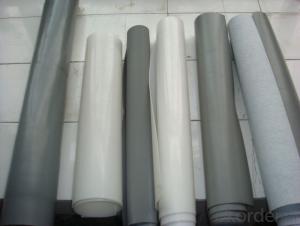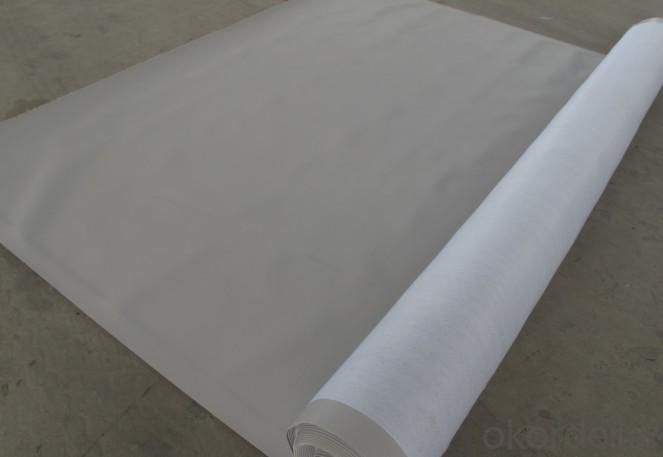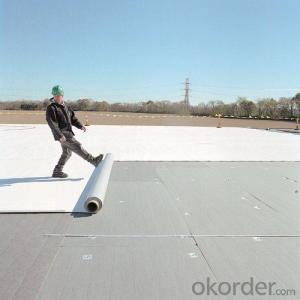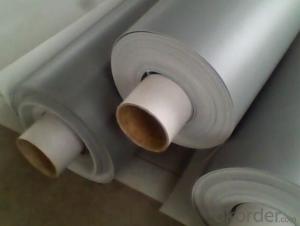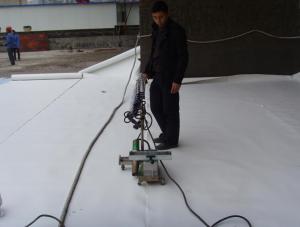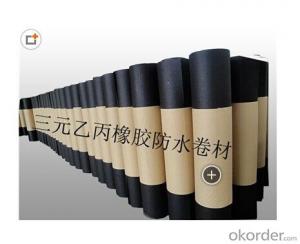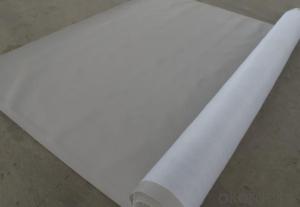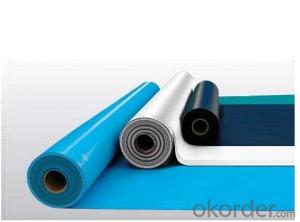PVC Roofing Waterproof Membrane with UV Resistance
- Loading Port:
- China main port
- Payment Terms:
- TT OR LC
- Min Order Qty:
- 1000 m²
- Supply Capability:
- 50000 m²/month
OKorder Service Pledge
OKorder Financial Service
You Might Also Like
PVC roofing waterproof membrane with UV resistance
PVC membrane can be used for waterproofing on the steel roof, walking roof , planting roof, tunnel, basement, etc.
PVC membrane introduction:
Polyvinyl Chloride (PVC) membrane waterproof membrane is a kind of polymer compound
waterproof membrane compound of polyvinyl chloride colophony, plasticizer, stabilizing agent
,ultraviolet radiation(UV) resistance agent, all kinds of dyes and other agent.
1) Thickness: 0.3mm-2.0mm
2) Color: gray, green, blue
3.) Width: 2.0m
PVC waterproofing membrane is improved recently. With the support of new technology,PVC waterproofing membrane, especially polyester reinforced pvc waterproofing membrane boasts the best quality in China at the moment.
This membrane is polyester reinforced, which provides high breaking and tearing strength needed to prevent excessive elongation and sheet deformation under the stresses produced by the lifting of the membrane under wind loads. The unique lacquer coating provides the membrane with an easy to clean surface and prolongs the life of the membrane by reducing plasticiser loss.
Characteristics of products:
Dimensionally stable
High mechanical strength
Vapour permeable
Highly flexible
Decay resistant
Root resistant
Weather and UV resistant
Hail resistant
High tensile strength
Application:
Reinforced PVC waterproof membrane forms an effective barrier to liquid water or water vapor in the roof construction for industrial and civil engineering, underground engineering such as subway & tunnel, water conservancy such as water pools & ditch, shelter, grain depot, land filling, dyke, sewage treatment and basement.
Installation:
Hot air welding equipment to weld all overlapping joints on site, forming a seam stronger than the membrane itself
Type:
N1—Exposed PVC waterproof membrane.
(It is mainly used as details treatment for exposed roof waterproof project)
N2—Non-exposed PVC waterproof membrane.
(It is mainly used as details treatment for non-exposed roof waterproof project)
L1—Exposed PVC waterproof membrane with fabric.
(It is mainly used for exposed roof waterproof project)
L2—Non-exposed PVC waterproof membrane with fabric.
(It is mainly used for non-exposed roof waterproof project)
W1—Exposed reinforced PVC waterproof membrane .
(It is mainly used for steel structure roof exposed waterproof project)
W2—Exposed reinforced PVC waterproof membrane .
(It is mainly used for steel structure roof non-exposed waterproof project)
Use scope:
-All kinds of roof .eg steel structure roof, planted roof and so on.
-Underground engineering, such as building basement, subways, tunnels, air Raid shelter, etc.
-Other projects like artificial lake , dam, water reservoir,, grain storehouse, etc.
FAQ of PVC Waterproofing Membrane
a.Can we get some samples before place order?
Answer: We can send the free samples to you by freight collect.
b.How many years can your PVC membrane guarantee?
Answer: We will guarantee the quality for 5 years at least.
c.Which countries you ever export the product?
Answer: We export the PVC membrane to South Africa, Middle east and even European countries.
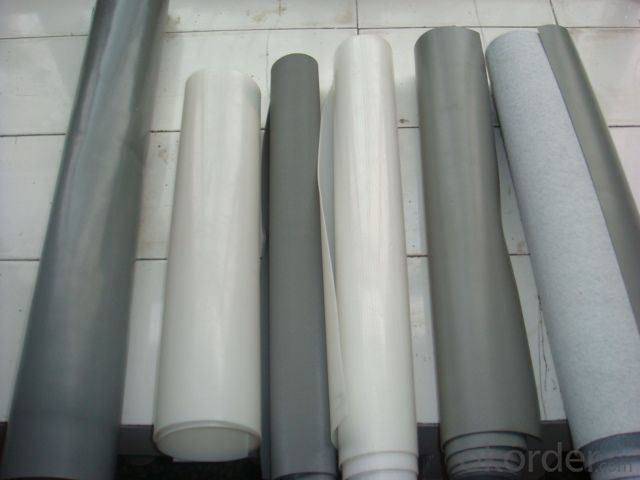
- Q: Can a waterproofing membrane be used on wood surfaces?
- Yes, a waterproofing membrane can be used on wood surfaces. It provides a protective barrier that prevents water from penetrating the wood, thereby prolonging its lifespan and preventing damage from moisture.
- Q: Does a waterproofing membrane require any specific safety precautions during installation?
- Specific safety precautions are necessary when installing a waterproofing membrane. Consider the following key precautions: 1. Personal Protective Equipment (PPE): Installers must wear appropriate PPE, such as gloves, safety glasses, and protective clothing, to avoid skin contact with the membrane and potential chemical hazards. 2. Adequate Ventilation: Ensure that the installation area has proper ventilation to prevent the accumulation of fumes or vapors. If working in a confined space, use ventilation systems to eliminate any potentially harmful gases or odors. 3. Hazardous Chemicals: Some waterproofing membranes contain hazardous chemicals or solvents. Installers should carefully read and adhere to the manufacturer's instructions for handling and using these products. Proper storage, handling, and disposal of chemicals are crucial to prevent accidents or environmental contamination. 4. Slips and Falls: The surface can become slippery during installation, particularly when applying the membrane on wet surfaces. Installers should take precautions to maintain stability and utilize safety equipment like harnesses or guardrails when working at heights to prevent falls. 5. Heat Hazards: Proper installation of certain waterproofing membranes requires the use of heat. Installers should exercise caution when working with heat sources such as torches or heat guns to prevent burns or fire hazards. Keep fire extinguishers readily available and ensure that personnel receive adequate training on fire safety protocols. 6. Electrical Safety: Waterproofing membranes might be installed in areas where electrical systems are present. Installers should exercise caution when working near live electrical wires or outlets and adhere to proper electrical safety procedures to prevent electric shocks or fires. It is crucial for installers to undergo comprehensive training and diligently follow all safety guidelines provided by the manufacturer. This will help minimize the risk of accidents, injuries, or property damage during the installation process.
- Q: Can a waterproofing membrane be used for a basement?
- Yes, a waterproofing membrane can be used for a basement. Waterproofing membranes are designed to prevent water infiltration and can effectively protect basements from moisture and potential water damage. They are typically applied to the exterior or interior walls and floors of basements to create a barrier against water seepage. This helps to keep the basement dry and protect against issues such as mold, mildew, and structural damage.
- Q: Can a waterproofing membrane be used for power plants?
- Indeed, power plants can make use of waterproofing membranes. Waterproofing membranes find widespread use in various settings where the prevention of water penetration is essential, and power plants are no exception to this. Within power plants, there are often sections that come into contact with water, such as cooling towers, wet flue gas desulfurization systems, and other water management systems. Incorporating waterproofing membranes within these areas aids in safeguarding the structures and equipment against water damage, corrosion, and leaks. Furthermore, underground structures like basements or tunnels, which are frequently present in power plants, can also benefit from the application of waterproofing membranes. These membranes act as a reliable barrier against water infiltration, thereby ensuring the durability and longevity of the power plant structures. Consequently, the utilization of a waterproofing membrane emerges as a practical and advantageous solution for maintaining the performance and dependability of power plant facilities.
- Q: Can waterproofing membranes be used on mechanical equipment rooms?
- Yes, waterproofing membranes can be used on mechanical equipment rooms. These membranes are designed to provide a protective barrier against water intrusion and prevent moisture damage to the underlying structures. Mechanical equipment rooms, which often house sensitive and expensive equipment, can benefit from the installation of waterproofing membranes to ensure the longevity and functionality of the machinery. By applying waterproofing membranes to the walls, floors, and ceilings of these rooms, it helps prevent water leaks, moisture buildup, and potential damage caused by water infiltration. This can be particularly important in areas prone to heavy rainfall, high humidity, or where the water table is high. Waterproofing membranes can also help in controlling condensation and preventing mold growth, which can be detrimental to the performance of mechanical equipment. Overall, the use of waterproofing membranes in mechanical equipment rooms is a practical and effective solution to protect the equipment and maintain their optimal performance.
- Q: Can waterproofing membranes be used on underground tunnels?
- Yes, waterproofing membranes can be used on underground tunnels. Waterproofing membranes are specially designed to provide a barrier against water penetration and are commonly used in various construction applications, including underground structures such as tunnels. These membranes are typically made of materials like bitumen, asphalt, or synthetic rubber, which have excellent waterproofing properties. When applied to the tunnel walls and floors, waterproofing membranes create a protective layer that prevents water from seeping into the tunnel. This is particularly important in underground tunnels as they are susceptible to water intrusion from surrounding soil or groundwater. By using waterproofing membranes, the integrity and durability of the tunnel structure are maintained, reducing the risk of water damage, corrosion, and deterioration. Furthermore, waterproofing membranes can also offer additional benefits such as providing resistance against chemical attacks, preventing the growth of mold and mildew, and improving the overall insulation of the tunnel. These membranes can be applied during the construction phase of the tunnel or as a retrofit solution to existing tunnels. It is important to note that the selection of the appropriate waterproofing membrane should be based on factors such as the type of tunnel, the expected water pressure, and the overall design requirements. Consulting with a professional engineer or waterproofing specialist is highly recommended to ensure the selection and installation of the most suitable waterproofing membrane for underground tunnels.
- Q: Can a waterproofing membrane be used on precast stone block surfaces?
- Yes, a waterproofing membrane can be used on precast stone block surfaces. A waterproofing membrane is designed to provide a protective barrier against water infiltration, and it can be applied to various surfaces, including precast stone blocks, to prevent water damage and ensure the longevity of the structure.
- Q: Can a waterproofing membrane be used on elevator pits?
- Yes, a waterproofing membrane can be used on elevator pits. Elevator pits are vulnerable to water damage due to their location below ground level and the potential for water infiltration. Installing a waterproofing membrane in the elevator pit can help protect the structure from water damage and prevent issues such as corrosion, mold growth, and deterioration. The membrane acts as a barrier, preventing water from seeping into the pit and causing damage to the elevator equipment or the surrounding structure. It is important to select a waterproofing membrane specifically designed for below-grade applications and to ensure proper installation to achieve effective waterproofing in elevator pits.
- Q: Can a waterproofing membrane be installed in areas with high humidity?
- Yes, a waterproofing membrane can be installed in areas with high humidity. In fact, it is even more important to have a waterproofing membrane in such areas to prevent moisture infiltration and potential damage to the structure.
- Q: How does a waterproofing membrane handle expansion and contraction of the substrate?
- A waterproofing membrane is designed to accommodate the expansion and contraction of the substrate through its flexibility and elasticity. It can stretch and contract along with the movement of the substrate, ensuring a watertight seal is maintained without compromising its integrity.
Send your message to us
PVC Roofing Waterproof Membrane with UV Resistance
- Loading Port:
- China main port
- Payment Terms:
- TT OR LC
- Min Order Qty:
- 1000 m²
- Supply Capability:
- 50000 m²/month
OKorder Service Pledge
OKorder Financial Service
Similar products
Hot products
Hot Searches
Related keywords
